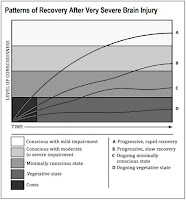Just finished a weekend of late shifts in a busy urban emergency department. Pretty tired but worked with a good team and we got some stuff done. Felt like taxpayer got a reasonable deal paying for us to be there, especially the old folk who were part of a generation that fought to have the NHS there for them later in life when they needed help, and the patients who would otherwise have been dead or badly disabled without rapid on-site intervention.
According to some clever folk, however, we were part of a failed system that needs to be changed urgently to save the NHS. We didn’t meet our targets, and our very existence encouraged people to come to a hospital when they could be equally or better cared for at home. We are the past. In the future, we can sit in a call centre, consult by video call, organise home teams to provide treatment, and then get a private company to deliver electronic tags to the patients’ homes so that we can watch them recover remotely.
Questioning my own lived experience, I went back through my patients across the three shifts in the different areas of the department. Resuscitation first. Cardioversion, major trauma management, intubation and ventilation, inotropic support, joint reduction under sedation, transfer to theatre for immediate surgery. Some patients were obviously unwell or badly injured from the start, but a few came in through from minors as potentially low risk, with presentations such as syncope or dizziness.
Next, the Majors area. I admitted many of these patients to hospital. Severe abdominal pain requiring titrated narcotic analgesia, asthma requiring back-to-back nebulisers and a bed near an ICU, fractured hips needing pain-relieving nerve blocks then surgery, and acute cardiac conditions with a risk of malignant arrhythmias potentially needing cardioverted or angiography to prevent long term heart failure. Three patients had severe delirium requiring emergency sedation. A handful of isolated frail elderly with acute medical decompensation who were now unable to mobilise safely or attend to basic self-care needs without immediate 24hour care.
Finally, the Minors area. I sent most of these patients home. Some came in with “red flag” presentations like thunderclap headache, cardiac sounding chest pain or paracetamol overdose. Scan, blood test, home with good negative test, done. Some had injuries needing x-rays or sutures. Done and away. Some had new presentations that had resolved like GI bleeding, DVT, TIA or seizures. Basic stuff done, discharged, specialist clinic follow-up. One had a deterioration in complex neurological disease and was admitted for tertiary care. A couple were sent through to majors or resus from triage with higher acuity illness, and two were removed by police in the triage or waiting areas for violent conduct.
I suspect most patients were reasonably happy with their care, except the ones that waited ages to be seen in minors because we were short staffed and providing default care to ward patients stranded in ED due to bed block. We are told however that 66% of this effort was wasted on “inappropriate” people who don’t need to be there, and who should be treated virtually in the future to free up capacity.
Reviewing the shifts, this is puzzling. We admitted those who needed critical care immediately, and those who had the potential to deteriorate and need defibrillated, ventilated, or invasively monitored. We investigated for potentially life changing conditions using readily available x-rays, CT scans and batteries of blood tests to allow the negatives to be safely discharged with a completed episode. Some definitive treatments were provided, all patients had the therapeutic effect of an in-person consultation, and some vulnerable patients were brought into a place of safety from precarious social circumstances.

Perhaps this is clinging on to the past and just throwing virtual sabots around. The dehumanisation of care is maybe just another part of the systemic social disconnection and downgrading of shared public spaces and services. For a patient to reap the benefits of virtual healthcare however will require living in a decent house, speaking English as a first language, and being young and educated enough to be able to make a monitored Avatar of yourself. Homeless, mental health problems, asylum seeker, elderly, no internet, illiterate, lonely? Please form a small queue for remaining hospital bed in the margins. The cost in terms of money and environment of all this innovation relative to centralised medical care is disputed. Certainly, a very large number of staff will spend a fair bit of time driving about or watching computer screens. A few private companies will make a lot of money supplying vast quantities of equipment.
Once the transformation is complete, the patient left alone at home who collapses and triggers their remote monitor will flag up to one of the redeployed Emergency Medicine staff in the call centre. They will then try to find a critical care response to send and what remains of a real hospital bed to put them in. At least if/when they arrive at the down-sized real-world facility, they won’t be labelled as inappropriate – at least until the next innovation.














